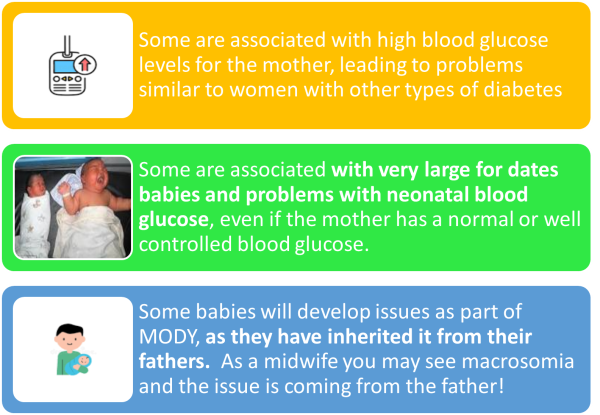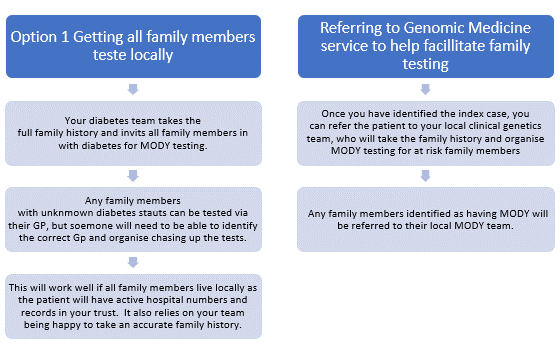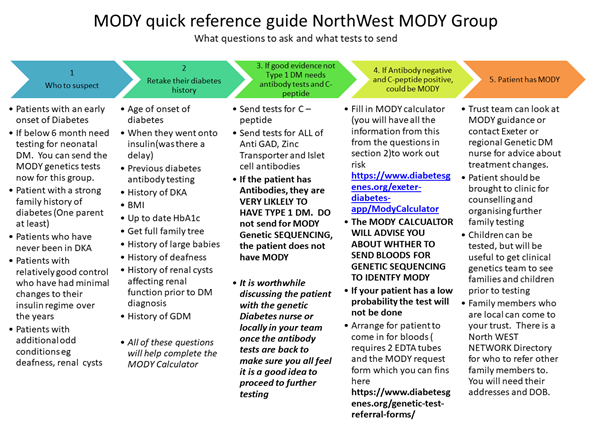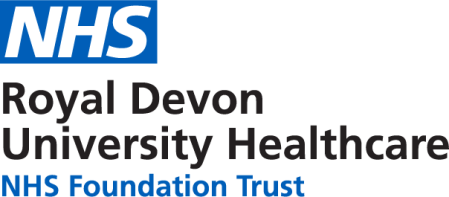This resources page aims to support Trusts to access training and information about monogenic diabetes and improve the management of MODY. We regularly hold webinars via Microsoft Teams, so we'd value your feedback on any future events and topics that you would like to see covered. To share your thoughts, please click here to complete our quick 60 second survey.
Monogenic diabetes or MODY are terms to describe a group of conditions with an autosomal dominant inheritance pattern. This means inheriting a single copy of an affected gene will cause the patient to inherit the same type of diabetes as their parent.
Aims:
- Improvements in the rates of identification by trust
- Increase in referral rates
- Increase in numbers of staff trained
- MODY is an abbreviation of Maturity Onset Diabetes of the Young and includes a group of genetic disorders where something is wrong with the way in which the patient manages insulin, leading to diabetes.
- These conditions are strongly inherited, you only need one MODY gene (instead of a gene pair) to show signs of the condition, in an inheritance pattern called autosomal dominance.
- If you have MODY you have a 50% chance of passing it on to each of your children.
Why do midwives need to know about?
- Several of the different MODY types are associated with problems in pregnancy.
- Each subtype does something a bit different, so there is more information about each type below
What do midwives need to do about it?
- Be aware these conditions exist
- At booking, if the expectant mother or father has diabetes in the family ask what type it is.
- If they tell you they (either parent) have MODY in the family, ask which type, and refer all patients to you local diabetes ANC for review within the next couple of weeks
- Depending on which MODY type, the mother and baby may need extra growth scans, a planned NICU bed or blood glucose monitoring.
- The families need special MODY tests in pregnancy where maternal blood can be taken to screen for baby genotype to work out risks. The Diabetes team will help work out if this is needed

Family testing for MODY patients (cascade testing)
As all forms of MODY are inherited in an autosomal dominant manner, family members of your patient who has diabetes may also have MODY.
Who needs to be tested?
- Any blood-related family member with Diabetes Mellitus
- Other family members can have HbA1c testing as a screening test before going on to get genetic testing
- Children are usually not tested until they are old enough to understand the testing (generally after 16 years of age). Most forms of MODY do not manifest issues for children, with patients only developing glucose-handling problems in adolescence or adulthood. Neonatal diabetes, although autosomal dominant, is often a de novo mutation


The infographic is available to download here.
The brand new podcast takes the listener on an engaging journey, into the worlds of diabetes and genetics. Hosted by experts Professor Andrew Hattersley and Professor Maggie Shepherd, the podcast is for anyone interested in diabetes or genetics. It will aim to be a non-technical look at how science and medicine can come together to help patients.
About the podcast
The title "1 in 6 Billion" comes from it needing just 1 change in the 6 billion pieces of genetic code for a patient to develop a genetic disease. 1 in 6 Billion will feature thought-provoking personal stories of people living with rare types of diabetes caused by a change in a single gene. The podcast features interviews with researchers explaining the excitement and frustrations of scientific discovery. It will aim to be in plain English and not to require any technical background.
So whether you're living with diabetes, a healthcare professional, a research scientist or just curious about the science behind it all; then this podcast has something for everyone.
The hosts
Professor Andrew Hattersley: Andrew is a doctor who after training as a medical consultant and researcher moved to Exeter in 1995. He works as a Professor in medical research at the University of Exeter and as a consultant at the Royal Devon University Hospital.
Professor Maggie Shepherd: Maggie is a nurse who worked as a diabetes specialist nurse in London for 8 years before joining the monogenic diabetes team in Exeter in 1995. She is now a Consultant Nurse at the Royal Deveon University Hospital and Clinical Professor of Monogenic Diabetes at the University of Exeter.
How to tune in
The podcast episode is available now, via major podcast platforms including Apple podcasts, Google podcasts and Spotify; simply search for “one in six billion”. The first episode was released at 9 am on 14th November, which is World Diabetes Day, with new episodes every 2 weeks. The website for the podcast is www.1in6b.com, this has links to the podcast episodes. There will also be a Facebook page and an X (formerly Twitter) account.
General information on MODY:
MODY: https://www.diabetesgenes.org/what-is-mody/
Neonatal diabetes: https://www.diabetesgenes.org/about-neonatal-diabetes/
Course on genomics and monogenic diabetes: https://www.futurelearn.com/courses/diabetes-genomic-medicine
On our website via general monogenic diabetes talks (3 videos found under ‘additional training’): https://www.diabetesgenes.org/training/
When to consider genetic testing:
Guidelines for genetic testing in MODY: https://www.diabetesgenes.org/tests-for-diabetes-subtypes/guidelines-for-genetic-testing-in-mody/
MODY calculator app: https://www.diabetesgenes.org/exeter-diabetes-app/
What do you need to do:
Genetic Test Referral Form: https://www.diabetesgenes.org/genetic-test-referral-forms/
Details on c-peptide and autoantibody testing: https://www.diabetesgenes.org/nongenetictests/
Various tests for diabetes subtypes: https://www.diabetesgenes.org/tests-for-diabetes-subtypes/
Resources for clinicians:
Self-paced online training course and 2 day training course: https://www.diabetesgenes.org/training/
Ongoing support through GMSA diabetes consultant and GDNs leads to extend / further develop skills (and access to Masterclasses once they are developed). https://www.diabetesgenes.org/training/genetic-diabetes-nurses/
Resources of patients:
https://www.diabetesgenes.org/tests-for-diabetes-subtypes/information-for-people-with-diabetes/
https://www.diabetesgenes.org/tests-for-diabetes-subtypes/information-for-family-members/
Education session for registrars, as part of Merseyside Regional Registrar Teaching Day, October 11 2023, at Aintree Hospital.
Acknowledgement: DiabetesGenes and the NHS Royal Devon University Healthcare NHS Foundation Trust

